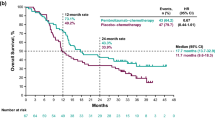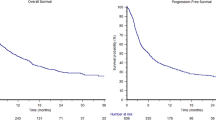Abstract
The only approved systemic therapy for patients with advanced hepatocellular carcinoma (HCC) till now is sorafenib. A preliminary study suggested that capecitabine, an oral fluoropyrimidine, may be effective in advanced HCC. We have tested this hypothesis in this phase 2 study. In this single-center, phase 2, open-label trial, we randomly assigned 52 patients with advanced HCC who had not received previous systemic treatment to receive either sorafenib (at a dose of 400 mg twice daily) or capecitabine (1,000 mg/m2 twice daily) (day 1–day 14). Primary outcome was progression-free survival. Secondary outcomes included the overall survival and safety. Median overall survival was 7.05 months in the sorafenib group and 5.07 months in the capecitabine group (hazard ratio in the capecitabine group 2.36; 95 % confidence interval 1.174–4.74; P < 0.016). The median progression-free survival was 6 months in the sorafenib group and 4 months in the capecitabine group (P < 0.005). Three patients in the sorafenib group (11.5 %) and one patient in the capecitabine group (3 %) had a partial response; one patient (3 %) had a complete response in the sorafenib group. Hand–foot skin reaction was more frequent in the sorafenib group, hyperbilirubinemia was more common in the capecitabine group, and diarrhea was equivalent between both groups. In patients with advanced HCC, capecitabine is inferior to sorafenib in terms of median progression-free survival and overall survival, and it should not be used alone for the treatment of advanced HCC, but rather, combination therapy with sorafenib should be considered.


Similar content being viewed by others
References
Graham J, Newman D, Smirniotopolous D, et al. Transplantation for hepatocellular carcinoma in younger patients has an equivocal survival advantage as compared with resection. Transpl Proc. 2013;45(1):265–71.
Cheng A, Kang Y, Chen Z, et al. Efficacy and safety of sorafenib in patients in the Asia-Pacific region with advanced hepatocellular carcinoma: a phase III randomised, double-blind, placebo-controlled trial. Lancet Oncol. 2009;10(1):25–34.
Llovet M, Ricci R, Mazzaferro V, et al. Sorafenib in advanced hepatocellular carcinoma. N Engl J Med. 2008;359(4):378–90.
Bruix J, Sherman M, Llovet JM, et al. Clinical management of hepatocellular carcinoma: conclusions of the barcelona-2000 EASL conference. European Association for the Study of the Liver. J Hepatol. 2001;35(3):421–30.
http://ctep.cancer.gov/protocolDevelopment/electronic_applications/docs/ctcaev3.pdf, Accessed on 5 June 2013.
Furuse J. Hepatocellular carcinoma: present treatment strategy in Japan. Ann Oncol. 2012;23(Suppl 9):ix63. doi:10.1093/annonc/mds487.
Altekruse F, McGlynn K, Dickie L, et al. Hepatocellular carcinoma confirmation, treatment, and survival in surveillance, epidemiology, and end results registries, 1992–2008. J Hepatol. 2012;55(2):476–82.
Schiefelbein E, Zekri AR, Newton DW, et al. Hepatitis C virus and other risk factors in hepatocellular carcinoma. Acta Virol. 2012;56(3):235–40.
Abou-Alfa GK, Schwartz L, Ricci S, et al. Phase II study of sorafenib in patients with advanced hepatocellular carcinoma. J Clin Oncol. 2006;24:1–8.
Bruix J, Raoul J, Sherman M, et al. Efficacy and safety of sorafenib in patients with advanced hepatocellular carcinoma: Sub analyses of a phase III trial. J Hepatol. 2012;57(4):821–9.
Furuse J, Ishii H, Nakachi K, Suzuki E, Shimizu S, Nakajima K. Phase I study of sorafenib in Japanese patients with hepatocellular carcinoma. Cancer Sci. 2008;99:159–65.
Boudou-Rouquette P, Narjoz C, Golmard JL, Thomas-Schoemann A, Mir O, et al. Early sorafenib-induced toxicity is associated with drug exposure and UGTIA9 genetic polymorphism in patients with solid tumors: a preliminary study. PLoS ONE. 2012;7(8):e42875.
Patt YZ, Hassan MM, Aguayo A, et al. Oral capecitabine for the treatment of hepatocellular carcinoma, cholangiocarcinoma, and gallbladder carcinoma. Cancer. 2004;101(3):578–86.
Sacco R, Bargellini I, Ginanni B, et al. Long-term results of sorafenib in advanced-stage hepatocellular carcinoma: what can we learn from routine clinical practice? Expert Rev Anticancer Ther. 2012;12(7):869–75. doi:10.1586/era.12.58.
Kelley RK, Venook AP. Sorafenib in hepatocellular carcinoma: separating the hype from the hope. J Clin Oncol. 2008;26(36):5845–8. doi:10.1200/JCO.2008.19.7996 Epub 2008 Nov 24.
Kudo M, Ueshima K, Arizumi T. Real-life clinical practice with sorafenib in advanced hepatocellular carcinoma: a single-center experience. Dig Dis. 2012;30(6):609–16. doi:10.1159/000343091.
Farrag A. Efficacy and toxicity of metronomic capecitabine in advanced hepatocellular carcinoma. J Hepatol. 2012;56(Supplement 2):S391.
Koschny R, Gotthardt D, Koehler C, et al. Diarrhea is a positive outcome predictor for sorafenib treatment of advanced hepatocellular carcinoma. Oncology. 2013;84(1):6–13. doi:10.1159/000342425.
Conflict of interest
We declare that we have no conflict of interest.
Author information
Authors and Affiliations
Corresponding author
Additional information
An erratum to this article is available at http://dx.doi.org/10.1007/s12032-015-0688-6.
Rights and permissions
About this article
Cite this article
Abdel-Rahman, O., Abdel-Wahab, M., Shaker, M. et al. Sorafenib versus capecitabine in the management of advanced hepatocellular carcinoma. Med Oncol 30, 655 (2013). https://doi.org/10.1007/s12032-013-0655-z
Received:
Accepted:
Published:
DOI: https://doi.org/10.1007/s12032-013-0655-z




